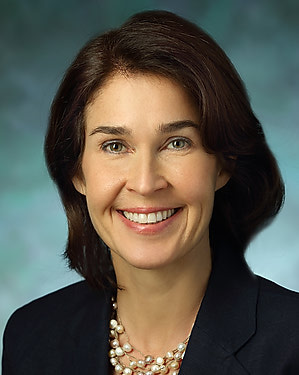Background
Rachel Bishop, M.D., M.P.H., is an ophthalmologist specializing in comprehensive eye care at the Wilmer Eye Institute’s locations in Frederick and Bethesda, Maryland.
Before studying medicine, Dr. Bishop was an officer in the U.S. Army, serving as a medical evacuation platoon leader and executive officer in South Korea and as a hospital administrator at Letterman Army Hospital in San Francisco.
She then pursued her medical degree at the University of Pennsylvania and, as a medical officer in the Army, completed ophthalmology residency training at the Walter Reed Army Medical Center in Washington, D.C. Following her residency, Dr. Bishop served as chief of ophthalmology at the Darnall Army Medical Center at Fort Hood in Texas. There she performed refractive surgery for thousands of soldiers before their deployment to Iraq and Afghanistan, and provided eye care for active duty military personnel, their families and retirees.
In 2006, Dr. Bishop transferred to the U.S. Public Health Service (USPHS) and joined the National Eye Institute (NEI), where as chief of the consult service, she cared for people participating in clinical trials throughout the many institutes and centers of the National Institutes of Health (NIH). In this role, Dr. Bishop monitored medication and treatment side effects, managed eye conditions related to NIH protocols, and provided comprehensive eye care for adults and children treated at NIH.
As a key NEI spokesperson, Dr. Bishop promoted eye health through a variety of media outlets, including TV and radio, print, and internet forums, and she helped produce educational videos and print materials for NEI. Continuing a career-long interest in medical ethics, she served as a member of NIH’s clinical bioethics committee for 12 years. In her final year at NEI, she led a strategic planning panel focused on low vision solutions and quality of life. She is interested in international public health, health economics and optimizing access to eye care through technology.
In 2019, Dr. Bishop retired from the USPHS, where she had been deputy commander of a 130-member rapid deployment force that provided medical care for people displaced during natural disasters.



Patient Ratings & Comments
The Patient Rating score is an average of all responses to physician related questions on the national CG-CAHPS Medical Practice patient experience survey through Press Ganey. Responses are measured on a scale of 1 to 5, with 5 being the best score. Comments are also gathered from our CG-CAHPS Medical Practice Survey through Press Ganey and displayed in their entirety. Patients are de-identified for confidentiality and patient privacy.